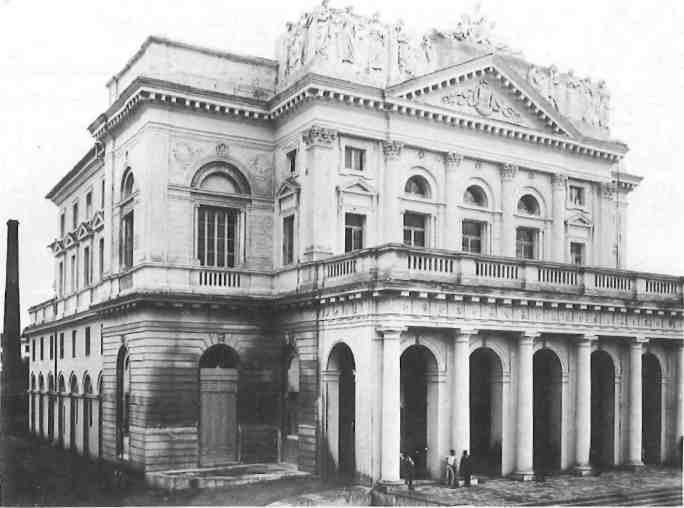When I went to live there, my Corfiot friends, learning that I had sung professionally, would say, ‘Ah well—you’ve come to the right place in Greece. We have produced all the best musicians!’ I admit I would react with inexcusable ‘tolerance’ remembering all the years of study, rehearsals, make-up, costumes, stage fright and dissatisfaction that went into my training and experience, but I eventually changed my attitude. The Corfiots, even if they have not sired all the best musicians in Greece, quite clearly possess a deep and fervent enjoyment and talent for making music.

My initial musical shock in Greece came the very first morning I awoke in Corfu. The raucous voice of a child carried brilliantly up to my open window, after having bounced against the house opposite (an arm’s length across the lane) which provided ideal acoustics. I understood nothing of the words, but the intensity of feeling was completely comprehensible: it was about a broken heart. I looked down and a jaunty boy of ten or so, arms flaying in the best (or worst) Italian operatic tradition was below, totally immersed in his song and savouring his own sound. A serenade.
Often, during those first months in Corfu, especially when the endless winter rains finally stopped and the balmy evenings began, I would hear serenades in sweet harmony, drifting down the narrow lanes, sometimes disappearing to an echo and emerging again as a corner was rounded. Four of five young Corfiots would come into view, arms linked, heads together, singing, with remarkably good voice, a tender ‘kantade.’ In the twilit streets of old Corfu, it was a scene from Venice.
Some would say that Venice did sharpen the musical wit of the Corfiot. At least a florid exposure to the musical arts began and appreciation for them flourished. The rest of Greece hummed and played the Ottoman tune (with its nasal, descending Oriental scale) and Corfu looked westward. The first opera on Greek soil in modern times was introduced by the Venetians in Corfu in the converted Loggia (a covered porch which was used as a meeting place) in 1733, and opera performances were given continuously through the French and British eras. The Loggia today is the Town Hall and it is not difficult to imagine what a handsome theatre it must have been.
Another and larger theatre was later built, the San Giacomo, and it was here that La Scala presented its productions, prior to their premieres in Milano. It was an Opera house in the grand manner of gilt and velvet. In the photographs existing, one can see the rather florid facade and showy porte-cachere. Alas, it was bombed and gutted during World War II.
A new theatre exists in Corfu but only just. A competition was held some years ago and the municipal choice is a block of light-grey marble, unfinished and consequently unsung.
Two names of the period, which the Corfiot lovingly calls the ‘golden age of music,’ are revered throughout Greece: Mantzaros and Samaras. Both men, Corfiots, gave an enormous impetus, through their music and work, to the new kingdom that was the united Greece. Mantzaros is the composer of the Greek national anthem, in which he set the words of the poet, Solomos, to music. Samaras, besides the ten operas he wrote, composed the song which has since become the official hymn of the Olympic Games.
During this same period, Mantzaros was turning out musicians at his school of music. The British Commissioner at that time had placed a ban on musical groups in the fear that it would ‘incite’ the populace. This ban was greatly resented, as it was a custom to have musical accompaniment during the procession of Corfu’s patron, Saint Spyridon. Because of this faux-pas on the part of the British Protectorate, the first instrumental ensemble in modern Greece came into being in 1840. It was and is known by the sumptuous name of the Saint Spyridon Philharmonic Society, or, more popularly, ‘the Old Philharmonic,’ as opposed to the Mantzaros Philharmonic Society, or logically, the ‘New Philharmonic’ To a stranger, the word ‘philharmonic’ means Toscanini and his New York orchestra or Furtwangler and Berlin. In Corfu, it means two gorgeously-dressed bands, wearing plumes and performing in the Victorian bandstand on summer nights, or participating in the procession in the Easter Eve ceremonies, playing the ‘Dead March’ from ‘Saul.’
The bands of Corfu, like those on the other Ionian Islands, are unique. There is nothing quite like them. The members’ ages range from twelve to seventy, and it is almost impossible to recognize your neighbour under his ‘kepi’ (a round white helmet, worn by the British in Africa). On Corfu, there are half a dozen bands scattered around the island, and the picturesque village of Gastouri, where the Corfu Festival is held, has the oldest of these bands, founded in 1910. The Gastouri Band also takes part at the Festival by performing at the opening ceremony.
A part of the activities of the 1973 Corfu Festival was the intimate free concerts given in an elegant square in Corfu Town called Kremasti, after the Venetian fountain in its centre. Here, one evening, I watched the silence of the neighbourhood, the Corfiots leaning out of their tall windows of the 18th century high-rise flats, listening to an intense, highly charged performance given by a beautiful Japanese girl, of an Unaccompanied Sonata for Violin by Bach. The rapt attention and the obvious pleasure of the audience said everything and more than any words could say about the Corfiot and his love of music.







